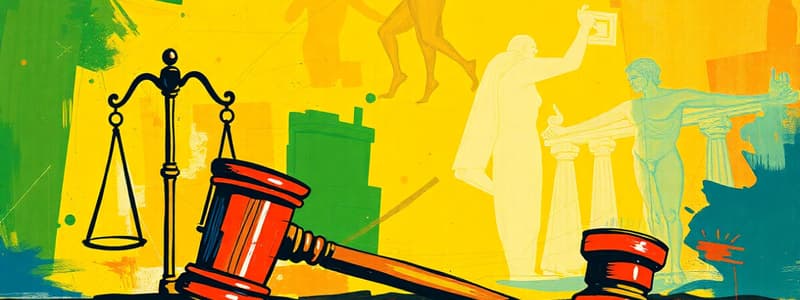Podcast
Questions and Answers
What does the expression 'without due process of law' imply according to Pandit Thakur Dass Bhargava?
What does the expression 'without due process of law' imply according to Pandit Thakur Dass Bhargava?
What power is granted to the judiciary under the definitions discussed?
What power is granted to the judiciary under the definitions discussed?
What concern did Chimanlal Chakkubhai Shah express regarding legislative review?
What concern did Chimanlal Chakkubhai Shah express regarding legislative review?
What is required for a search or seizure as mentioned in the article?
What is required for a search or seizure as mentioned in the article?
Signup and view all the answers
Which phrase best summarizes the essence of due process in this context?
Which phrase best summarizes the essence of due process in this context?
Signup and view all the answers
What was Justice Frankfurter's view on the concept of due process in relation to judicial review?
What was Justice Frankfurter's view on the concept of due process in relation to judicial review?
Signup and view all the answers
According to Seervai, what was the intention of the Drafting Committee when they replaced 'due process of law'?
According to Seervai, what was the intention of the Drafting Committee when they replaced 'due process of law'?
Signup and view all the answers
What foundational document is mentioned as significant for establishing the rule of law and the concept of 'due process'?
What foundational document is mentioned as significant for establishing the rule of law and the concept of 'due process'?
Signup and view all the answers
Which of the following best describes the content of the mentioned articles of the Magna Carta?
Which of the following best describes the content of the mentioned articles of the Magna Carta?
Signup and view all the answers
What limitation does Seervai suggest exists regarding the doctrine of 'basic structure' for the Constitution of India?
What limitation does Seervai suggest exists regarding the doctrine of 'basic structure' for the Constitution of India?
Signup and view all the answers
Study Notes
Due process vs. Procedure established by law
- The Drafting Committee of the Indian Constitution opted for "procedure established by law" over "due process of law"
- "Procedure established by law" emphasizes procedural safeguards, while "due process of law" encompasses both procedural and substantive safeguards.
- Seervai argues that the committee did not make the "due process" concept more precise; it rejected the idea altogether.
- The debate around "due process" and "procedure established by law" reflects the broader discussion on the balance between individual liberty and social control in a democracy.
- Justice Frankfurter of the US Supreme Court argued that the US Supreme Court's expansion of "due process" into a substantive safeguard made judicial review undemocratic.
- He argued that this allows the court to strike down government policies based on their substantive content, even if they follow proper procedures.
Debate in India’s Constituent Assembly on the "due process" clause
- Several members argued for the inclusion of the "due process" clause in the Indian Constitution, believing it would offer stronger protections for individual rights.
- Members such as Pandit Thakur Dass Bhargava, Chimanlal Chakkubhai Shah, Krishna Chandra Sharma, and K.M.Munshi believed that "due process" would ensure fair trial in both procedure and substance, and would protect against state overreach.
- They argued that "due process" had not created significant problems in the US judicial system and could act as a vital check on the executive branch's power.
- Alladi Krishnaswami Ayyar favored "procedure established by law," expressing concerns about the inconsistencies in the US Supreme Court's interpretation of "due process".
Ambedkar’s arguments on "due process"
- Dr. B. R. Ambedkar argued that the "due process" clause would give the judiciary the power to evaluate laws not only on the ground of legislative authority but also on the ground of whether they align with fundamental principles of individual rights.
- He argued that with "due process," the judiciary could declare laws invalid even if they were legally valid, if they violated fundamental principles.
- His view reflects the potential for expanded judicial power under "due process" and the potential for conflicts between the judiciary and the legislature.
Debates on preventive detention
- The Constituent Assembly debated the inclusion of a clause on preventive detention, which allows for detaining individuals without trial, under Article 15A.
- Members expressed concerns that the power of preventive detention could be misused, leading to tyranny or arbitrary detention.
- They argued for stronger safeguards for detainees, including the right to legal aid, access to judicial remedies, and timely notification of the grounds for arrest.
Studying That Suits You
Use AI to generate personalized quizzes and flashcards to suit your learning preferences.
Related Documents
Description
Explore the debate between 'due process of law' and 'procedure established by law' in the context of India's Constitution. This quiz delves into the implications of each approach on individual liberty and government control, along with perspectives from key legal figures like Justice Frankfurter. Test your understanding of this critical aspect of constitutional law in India.




